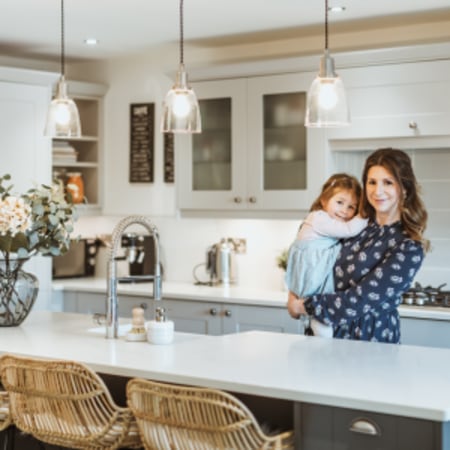Washing Machines: Buying Guide
Washing Machines
No matter if you live in a studio flat or have an open plan kitchen, a washing machine is one of the most important appliances you can have in your home. Having clean clothes is one of those creature comforts we take for granted and having a machine that can do all that cleaning for us gives us time to focus on other important tasks.
Washing machine technology has advanced leaps and bounds in the last decades. The best washing machines are incredibly fast and efficient compared to older models, and they’re only getting more impressive with additional wash programs and features.
But buying a washing machine is no simple task. You’ll need to consider a variety of important factors such as a machine’s drum size, its program cycles, and whether it’s considered a reliable model. On top of this, you’ll also need to account for the space you want to put your washing machine, as well as setting yourself an appropriate budget.
Fortunately, our thorough washing machine buying guide contains everything you need to know when looking to buy a washing machine, meaning you can easily pick the best washing machine for your kitchen.

Before you start
Thanks to how advanced modern washing machines are becoming, we no longer have to endure one size fits all models. You’ll have a vast range of designs to choose from when deciding which washing machine is best for your home. But you shouldn’t pick a washing machine based solely on its features.
More expensive washing machines tend to be bigger than mid-range designs, and while they come with many desirable extras, they might not properly fit the space you picked out for them while extending well over your budget.
Space
The very first thing you’ll need to do before buying a washing machine is to measure the space you plan on storing it. This is especially important if you plan to put your washing machine in your kitchen as you don’t want it to stick out under the worksurfaces or be wedged tightly between your kitchen cupboards.
The average washing machine is around 85cm in height and 60cm in width. A washing machine of this size will comfortably sit under your worktops and still have space to adjust if required. Be sure to measure its depth as well. Washing machine depths vary between 40-70cm, so find a model that matches the depth of your kitchen cabinets and then reduced it by 5-10cm. This will give you the necessary space for the pipes and connectors at the back.
An important thing to note is that the depth of your washing machine will determine its drum size. So, if you want a specific drum size, you might need to consider moving your original placement to somewhere more suitable. Also bear in mind that a washing machine’s dimensions do not include the door opening and buttons. Be sure to account for extra space to accommodate these.
Budget
Much like when purchasing a dishwasher, you’ll need to set aside a healthy budget to pick up the best washing machine for your home. Washing machines can cost anything from £150-1,000. Fortunately, some of the best washing machines sit comfortably between £300-500. Additional features, faster spin cycles, and larger drums will increase the price but not so much as to put you over budget.
It’s also a good idea to consider your washing machine’s running costs. These will vary between models, potentially costing you as little as £20 or as much £100. Larger machines will cost you more in the long run while inefficient machines will likely send your costs sky-high within the first week. On average though, the best washing machines will cost around £34 a year to run.
Energy ratings
The energy rating of a washing machine relates specifically to how efficient a particular model is on a standard 60 degrees wash setting with regards to energy and water consumption. A washing machine’s energy rating can range from the high D class to the low A+++ class. Most types of washing machines sit in the A+ class, meaning they’re very efficient compared to other appliances.
Some washing machines do fall into the A+++ class, however, research has shown that these machines are actually less efficient overall as most families wash their clothes at 40 degrees setting. In this case, A+ machines are actually more efficient. Research the models that interest you to get a better understanding of their efficiency, this is one of the best ways to find out which washing machine is best for your kitchen.
A high level of efficiency also doesn’t necessarily mean that your clothes will be cleaner. An efficient washing machine might use less power and water but that is no guarantee that it will clean persistent stains. Again, be sure to check reviews to see how effective potential models are.
Types of washing machine
Regardless of the size of the space you’ve reserved for your machine, you’ll still be able to choose from one of the four types of washing machine. Consider each type carefully as they each come with their own unique benefits and drawbacks, which will help determine which washing machine is best for you.
Freestanding washing machines
Freestanding washing machines are the most common type of model and only need a drain and a socket connection to function. They have the biggest range of available models and the widest selection of drum sizes. They also often include a bigger suite of features than other types of washing machine and can be easily moved for repairs. They can even be taken with you when moving house.
The greatest downside of a freestanding washing machine is that they don’t tend to blend very well prebuilt kitchen designs, especially if you have a fitted kitchen with a specific aesthetic.
Integrated washing machines
Integrated washing machines are the exact opposite of freestanding models when it comes to kitchen design. They’re able to seamlessly blend in behind a cupboard door and many models are recessed at the base so you can attach a matching skirting board. The biggest advantage of integrated washing machines is their quieter nature thanks to the cupboard door’s sound buffering effect. You can also find semi-integrated models with the controls exposed on top for easy control, but there are very few models currently available.
Integrated washing machines are great for small kitchens but fall down in the feature and capacity department. Many integrated washing machines have fewer wash options overall, come with reduced spin speeds, and due to their integrated nature, have a limited drum size. The biggest integrated washing machines might only have a maximum capacity of 8kg, so if you need more room, an integrated washing machine probably isn’t the best washing machine for you.
You also can’t use an integrated model as a freestanding machine. They’re not balanced for this, instead being kept in place by the cabinets either side of them. They’re also trickier to repair and move. If you’re budgeting for an integrated washing machine, you’ll also need to account for installation costs. The installation cost for an integrated dishwasher is typically twice that of a freestanding model, sometimes as much as an extra £80. On top of this, some retailers won’t install integrated washing machines, so be sure to check their installation policy before purchase.
Washer dryers
Washer dryers offer you a combination option for both washing and drying your clothes. These washers are perfect if you’re short on space, making them particularly useful in studio flats where you might not have room to properly dry all your clothes at once.
Unfortunately, washer dryers tend to have smaller load capacities overall, especially for their dryers, and they don’t excel at washing or drying when compared to dedicated washing machines and tumble dryers.
Smart washing machines
Smart washing machines are the most expensive type of washing machine but can be either freestanding or integrated. Not only does this choice give you the flexibility to account for your kitchen’s size, but they also come with a host of useful features.
Their biggest benefit is giving you the ability to control your washing machine from your phone via an app, dictating programs and activation as and when you choose as well as FAQs if you need to perform repairs. Some smart washing machines also come with sensors to detect weight, dirt, and fabric, they then provide the optimal setting and time for your wash.
Smart washing machines are incredibly useful and really give your washing machine that modern touch, but they’re expensive and require an internet connection in order to connect to your phone.

Washing machine features
No matter whether you choose a freestanding or integrated washing machine, the suite of features it comes with are going to be just as important as the machine itself. Many of these features are lacking in older models but having all of these won’t necessarily provide you with the best washing machine. Consider carefully which features you’ll actually use and aim to find a machine that has these specifically.
Capacity
One of the most vital elements to any washing machine, capacity governs how much weight a washing machine can load before it drops in efficiency or ceases to function correctly. A large capacity is useful, but it will also increase a machine’s price the larger it gets. Washing machine capacity ranges between 5-12kg on most freestanding models, with integrated models maxing out at 8kg.
For a single person, a washing machine of 5kg will be more than enough, but even the average middle-class family will likely only need a machine with a capacity of 7-8kgs. If you do find yourself doing a lot of washing on a regular basis, however, then buying a washing machine with a bigger capacity might be more beneficial.
Spin speeds
A washing machines spin cycle occurs at the end of the wash and determines how dry your clothes will be when a program ends. The higher the spin cycle, the dryer your clothes will be, meaning you don’t have to hang them out as long. Plenty of washing machines allow you to pick and choose your spin speed depending on your load size but most operate on settings between 1,000 and 1,600rpm (revolutions per minute), however, some of the more expensive models go as high as 1,800rpm.
A higher spin speed will dry your clothes faster, but it will also increase both noise and cost. Higher spins speeds aren’t always more efficient either and you’ll start to see diminishing returns as the speed increases. A washing machine with a spin speed of 1,400rpm is more than adequate for most loads.
Wash programmes
A good range of wash programs is a necessity for all washing machines. All models come with pre-set programs to wash cottons and synthetics, with a range of temperature choices sitting between 30 and 60 degrees. Many also come with pre-wash and eco-settings, allowing you to tailor each wash as required.
While this suite of settings might be enough for a smaller household, it can be useful to have a machine that caters to specific wash types, especially if you have kids. Plenty of washing machines now offer a 15-minute quick wash to fresh up clothes, a baby clothes setting, and even high-intensity sports washes to remove tough stains. There are also anti-allergen washes to eliminate all detergent for those with sensitive skin and larger machines might also offer washes for pillows and duvets with auto-weight settings for the optimal wash.
Drum sizes
Slightly different from capacity, your washing machine’s drum size is the specific size of its washing drum. The bigger the drum, the more clothes you can fit in and the more room they’ll have to move and wash. The size of your washing machine’s drum is dependent on its capacity, and much like capacity, a bigger drum isn’t always better.
For maximum efficiency, washing machine drums need to be close to full when used, otherwise your running costs will increase due to wasted water. Bigger drums also cost more and make more noise, so if you don’t wash large volumes of clothes regularly, a smaller drum is better.
Noise
High spin speeds and bigger drums create more noise. It’s difficult to mute washing machines but some are definitely louder than others. This isn’t so much of an issue if you have a utility room, but if your washing machine is in your kitchen then you might want a quieter model. Look at a machines decibel rating to get an estimation for its noise level. 60 dB is equal to the level of a normal conversation and will be quiet enough not to be overly disturbing.
Extra features
If you want to really get specific on your machine’s features, be sure to take a look at its control panel layout for clarity and ease of use. Good LED displays make it easy to see how much time is remaining and what washes you’re picking. An additional steam setting can help reduce creasing at the end of a cycle, child locks can prevent them from being opened, and a frontal filter means you can unblock your washing machine on your own.
Colours and finishes
Washing machines come in all manner of common colours such as black, white, red, and silver. There are even metallic finishes which can look great in kitchens if your aesthetic matches them. With larger porthole options with coloured glass, it's easier than ever to narrow down and pick a design of your liking that will really fit with your kitchen.

Where to buy a washing machine
You can buy washing machines in-store or online from a range of home retailers. Here at Wren Kitchens, we stock a wide range of freestanding and integrated washing machines, many of which you can incorporate into a fully fitted kitchen design. Take a look at our selection and find the washing machine that’s right for you.
At Wren Kitchens, we have a veteran team of experts with decades of experience in designing peoples dream kitchens. Get in touch today and book an appointment in one of our showrooms. We’ll go with you step by step to find each appliance to make your dream kitchen.
If you want to fit your kitchen out even further but want to do more research, you can find a range of kitchen and appliance buying guides in our inspiration section.













